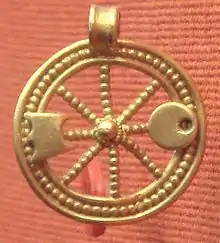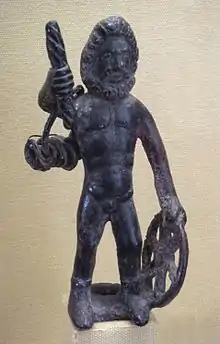Andarta
Andarta was a Celtic goddess worshiped in southern Gaul. Inscriptions invoking her name have been found among the Vocontii in southern France, and in Bern, Switzerland.[1][2]
| Look up Andarta in Wiktionary, the free dictionary. |
Name
The Gaulish theonym Andarta is traditionally interpreted as meaning 'Great Bear', perhaps 'powerful bear' or Ursa Major, formed with an intensifying suffix and- attached to a feminine form of artos ('bear').[1][2] Andarta might thus have been a counterpart or an alternative name of the Celtic bear goddess, Artio.[2]
According to linguist Blanca María Prósper, however, "this idea is uncompelling because the semantics lack good parallels and the inner syntax of the compound is utterly problematic." In her view, the name should be rendered as Andartā ('Well-fixed, Staying firm'), formed with a prefix *h₂ndʰi- (or *h₁ndo-) attached to a participle *-h₂-rtó ('fixed, composed, built'; cf. Sanskrit ṛta 'cosmic law, order', Greek artús 'arrangement', Latin artus 'joint').[3]
References
Notes
- Delamarre 2003, pp. 55–56.
- MacKillop 2004, s.v. Andarta and bear.
- Prósper 2018, p. 12.
Bibliography
- Delamarre, Xavier (2003). Dictionnaire de la langue gauloise: Une approche linguistique du vieux-celtique continental. Errance. ISBN 9782877723695.
- MacKillop, James (2004). A dictionary of Celtic mythology. Oxford University Press. ISBN 0-19-860967-1.
- Prósper, Blanca María (2018). "The Venetic Inscription from Monte Manicola and Three termini publici from Padua: A Reappraisal". Journal of Indo-European Studies. 46 (1 & 2): 1–61.

